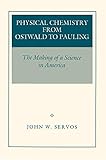Physical Chemistry from Ostwald to Pauling : The Making of a Science in America / John W. Servos.
Material type: TextPublisher: Princeton, NJ : Princeton University Press, [2022]Copyright date: ©1990Description: 1 online resource (430 p.) : 8 line illustrations, 13 tablesContent type:
TextPublisher: Princeton, NJ : Princeton University Press, [2022]Copyright date: ©1990Description: 1 online resource (430 p.) : 8 line illustrations, 13 tablesContent type: - 9781400844180
- Chemistry, Physical and theoretical -- History
- Chemistry, Physical and theoretical -- United States -- History
- SCIENCE / History
- American Physical Society
- Arrowsmith
- Baker Chemical Laboratory
- Bergman, Torbern
- Bunsen Gesellschaft
- Carnegie, Andrew
- Chemical Foundation
- Columbia University
- Coming Glass Company
- Du Pont Company
- Eastman Kodak Company
- General Education Board
- Guggenheim Foundation
- Harvard Medical School
- Hoover, Herbert
- International Education Board
- Johnston, John
- Journal de chimie physique
- Kopp, Hermann
- Laplace
- Leiden, University of
- Liverpool, University of
- Marsh, Othniel
- National Academy of Sciences
- Nernst, Walther
- Newburyport
- Ostwald, Wolfgang
- Pauli, Wolfgang
- Princeton University
- Research Corporation
- Rodebush, Worth
- Schmidt, Karl
- Stockholm Hogskola
- Tammann, Gustav
- Thomsen, Julius
- Waage, Peter
- Wiedemann, Gustav
- Wislicenus, Johannes
- Yerkes Observatory
- adsorption
- allgemeine Chemie
- chemical potential
- energetics
- free energies
- optical glass
- principle of maximum work
- resonance
- solubility-product principle
- specialization
- ultramicroscope
- unit operations
- 541.3/0973 20
- QD452.5.U6
- QD452.5.U6
- online - DeGruyter
| Item type | Current library | Call number | URL | Status | Notes | Barcode | |
|---|---|---|---|---|---|---|---|
 eBook
eBook
|
Biblioteca "Angelicum" Pont. Univ. S.Tommaso d'Aquino Nuvola online | online - DeGruyter (Browse shelf(Opens below)) | Online access | Not for loan (Accesso limitato) | Accesso per gli utenti autorizzati / Access for authorized users | (dgr)9781400844180 |
Frontmatter -- Contents -- List of Figures -- List of Tables -- Preface -- Acknowledgments -- List of Note Abbreviations -- CHAPTER 1. Modern Chemistry Is in Need of Reform -- CHAPTER 2. Physical Chemistry from Europe to America -- CHAPTER 3. King Arthur's Court: Arthur A. Noyes and the Research Laboratory of Physical Chemistry -- CHAPTER 4. The Phase Ruler: Wilder D. Bancroft and His Agenda for Physical Chemistry -- CHAPTER 5. Physical Chemistry in the “New World of Science” -- CHAPTER 6. From Physical Chemistry to Chemical Physics -- CHAPTER 7. A Dissenter’s Decline -- Notes -- Index
restricted access online access with authorization star
http://purl.org/coar/access_right/c_16ec
John Servos explains the emergence of physical chemistry in America by presenting a series of lively portraits of such pivotal figures as Wilhelm Ostwald, A. A. Noyes, G. N. Lewis, and Linus Pauling, and of key institutions, including MIT, the University of California at Berkeley, and Caltech. In the early twentieth century, physical chemistry was a new hybrid science, the molecular biology of its time. The names of its progenitors were familiar to everyone who was scientifically literate; studies of aqueous solutions and of chemical thermodynamics had transformed scientific knowledge of chemical affinity. By exploring the relationship of the discipline to industry and to other sciences, and by tracing the research of its leading American practitioners, Servos shows how physical chemistry was eclipsed by its own offspring--specialties like quantum chemistry.
Mode of access: Internet via World Wide Web.
In English.
Description based on online resource; title from PDF title page (publisher's Web site, viewed 29. Jun 2022)


